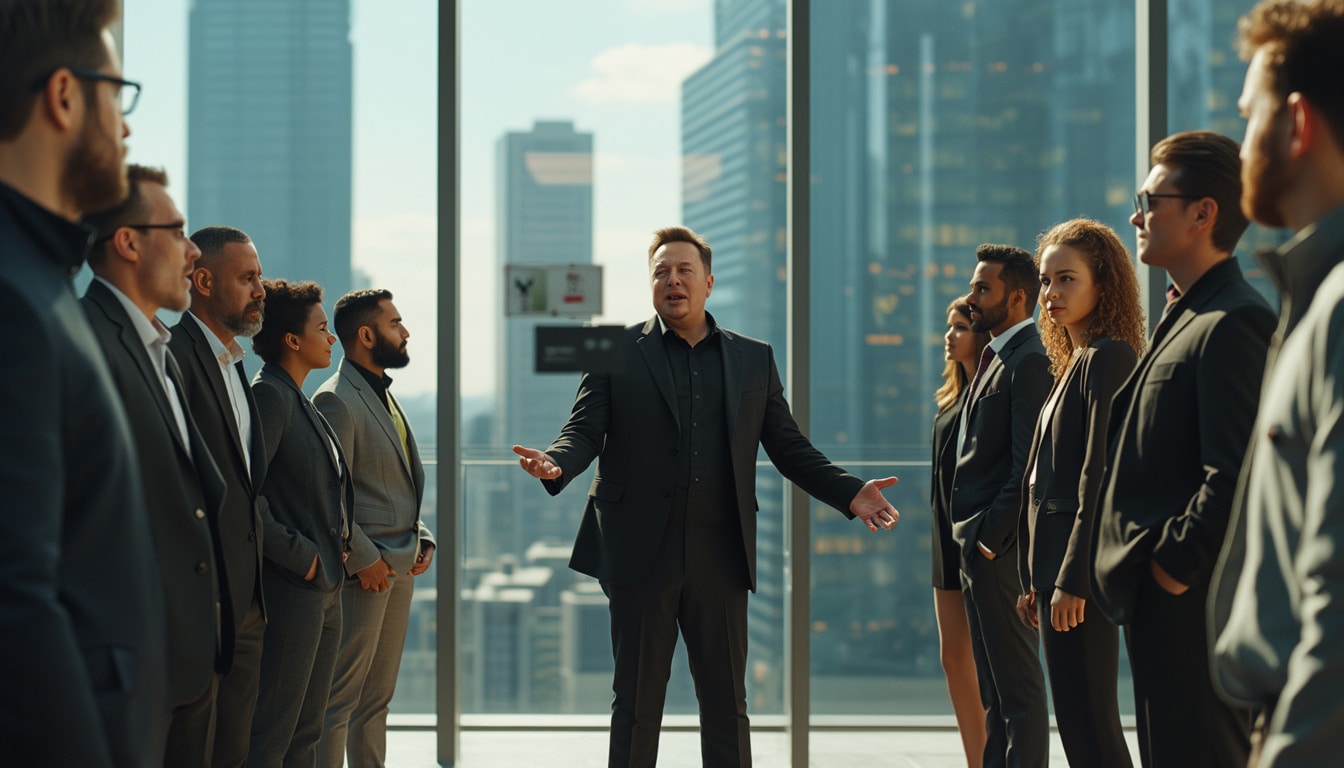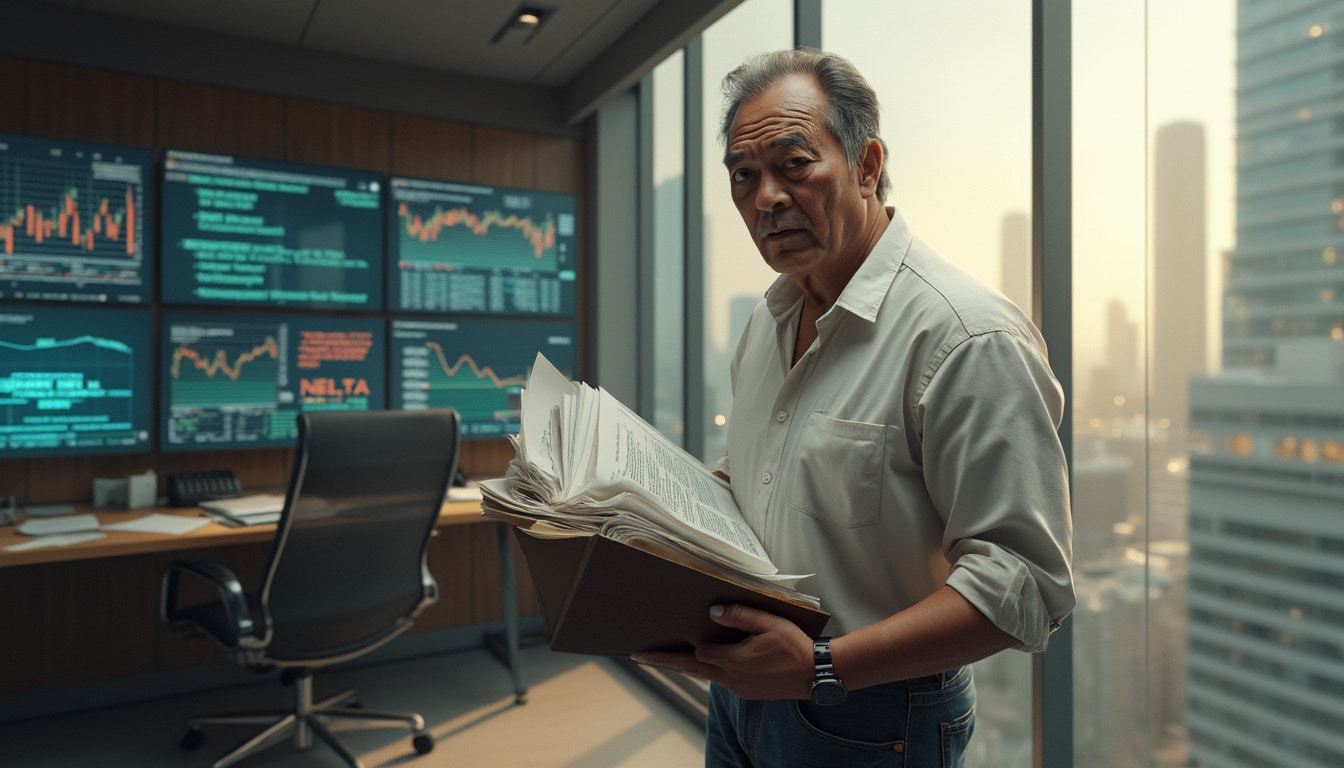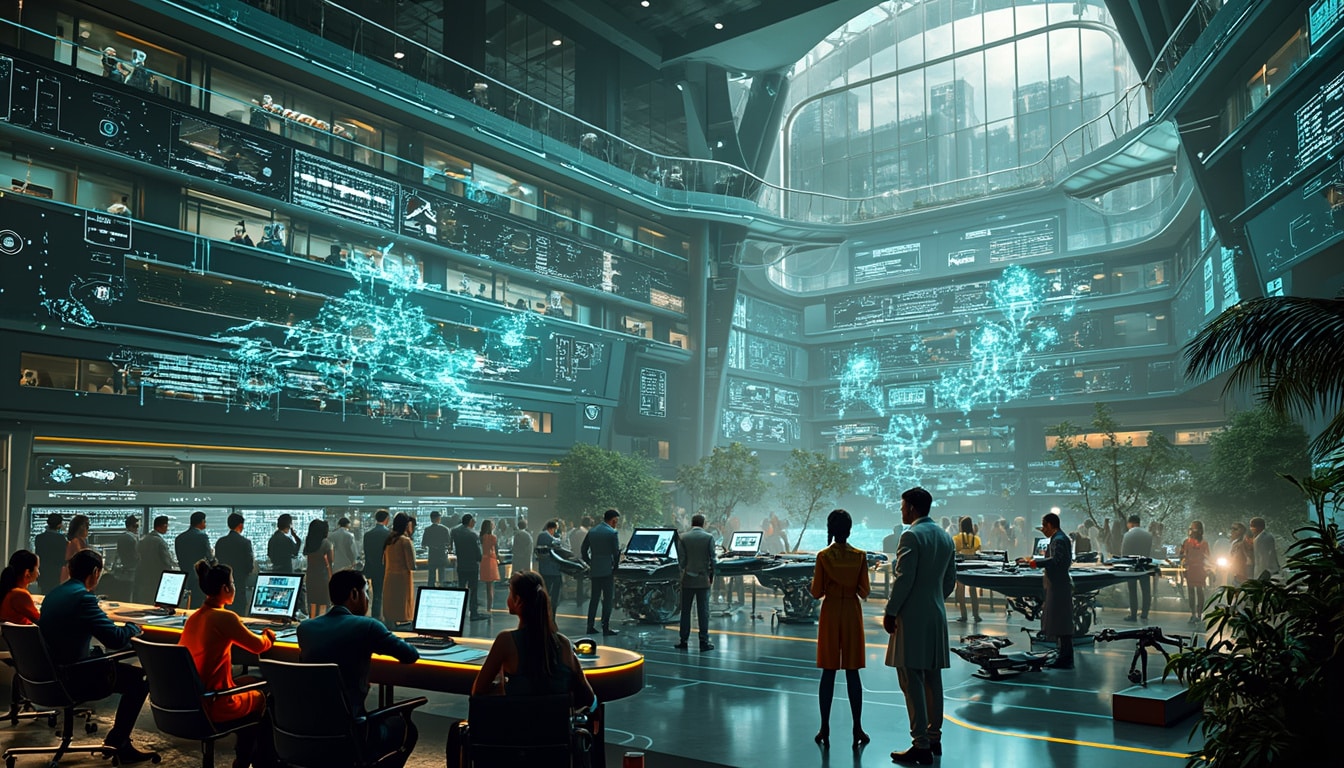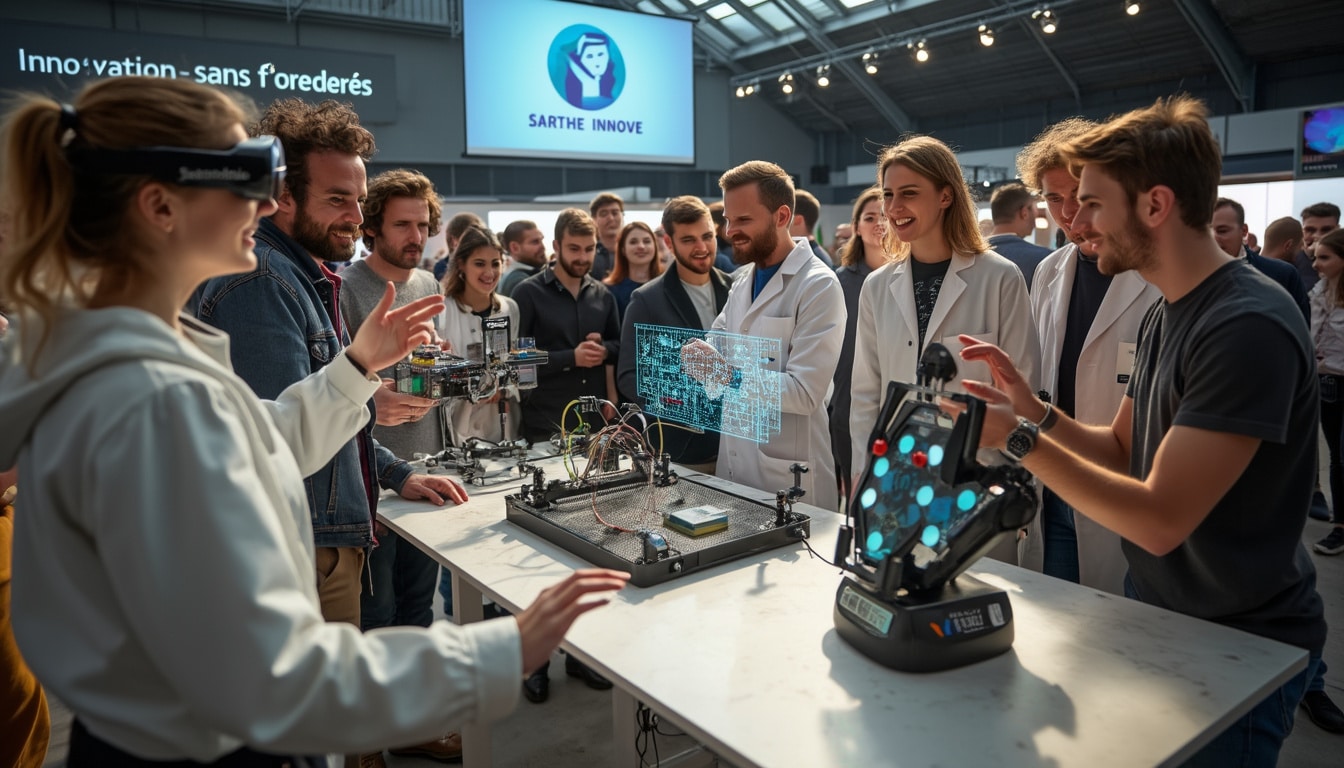« `html
Hold onto your keyboards, folks! Former OpenAI employees are joining forces with none other than Elon Musk.
Yes, the same Musk who’s known for space rockets and electric cars is now diving headfirst into the AI arena.
Their mission? To prevent OpenAI from morphing into a profit-driven behemoth.
This unexpected alliance has sent shockwaves through the tech community, sparking intense debates about the future of artificial intelligence. With legal battles on the horizon, the clash between maintaining ethical foundations and pursuing financial gains is more heated than ever. As supporters of both sides rally their troops, the outcome could reshape the landscape of AI development for years to come.

In the ever-evolving world of artificial intelligence, drama seems to be the latest ingredient stirring the pot. OpenAI, once heralded as a beacon of ethical AI development, is now embroiled in a high-stakes battle that has grabbed headlines across the tech landscape. At the heart of this turmoil? A group of former employees joining forces with none other than Elon Musk, the maverick entrepreneur known for his ventures with Tesla and SpaceX. Let’s dive into the nitty-gritty of this internal conflict and explore what it means for the future of AI.
Table of contents
Togglewhat sparked the feud between ex-openai staff and the company
The seeds of discord were planted back in 2023 when Elon Musk, a co-founder of OpenAI, initiated a lawsuit against Sam Altman and his team. Musk accused OpenAI of veering away from its original mission of advancing AI for the greater good, instead morphing into a profit-driven entity. This legal tussle set the stage for what would become a significant rift within the company.
Fast forward to this week, and the plot thickens. A dozen former OpenAI employees, including engineers, technical leads, and ethicists, have thrown their support behind Musk’s lawsuit. These ex-employees argue that OpenAI’s shift towards monetization compromises its foundational values. “The transformation of OpenAI into a for-profit powerhouse is a betrayal of our original mission,” stated Nisan Stiennon, a former AI engineer at OpenAI from 2018 to 2020.
This move by the former staff isn’t just a random act of defiance; it’s a calculated effort to halt the company’s pivot. By aligning with Musk, they aim to preserve OpenAI’s non-profit ethos, fearing that unchecked commercialization could lead to ethical breaches and misuse of AI technologies.
For more insights into the challenges faced by AI companies, check out this article on Innovanews.
how the legal battle could reshape the ai industry
The ongoing legal battle between OpenAI and Elon Musk has significant implications for the broader AI industry. At its core, this conflict revolves around the governance and ethical use of AI technologies. If the courts side with Musk and the former employees, OpenAI might be forced to revert to its non-profit roots, potentially limiting its capacity to scale and innovate.
Conversely, if OpenAI successfully defends its shift to a hybrid model, it could set a precedent encouraging other AI firms to adopt similar structures, balancing profit motives with ethical considerations. This outcome could lead to a more commercially viable AI sector, attracting substantial investments but also raising concerns about the prioritization of profit over public good.
Moreover, this lawsuit brings to light the critical question of AI governance. As AI technologies become more integrated into daily life, the need for robust regulatory frameworks becomes paramount. The judiciary’s decision in this case could influence how other tech companies navigate the fine line between innovation and ethical responsibility.
For a deeper understanding of the financial dynamics at play, visit Innovanews’ analysis.
why former employees joined forces with Musk against openai
Why did these former employees decide to side with Musk? The answer lies in their profound concern for the future of AI. These individuals, many of whom held influential positions within OpenAI, believe that the company’s shift towards profit compromises its ability to develop AI responsibly.
Nisan Stiennon articulates a chilling vision: “One day, OpenAI could create a technology that might pose existential risks for humanity purely for financial gains.” Such a scenario underscores the urgency these former employees feel in safeguarding OpenAI’s mission. By backing Musk, they hope to influence the company’s direction, ensuring that ethical considerations remain at the forefront.
This unity among ex-employees highlights a broader unease within the tech community about the rapid commercialization of AI. It reflects a growing belief that without stringent ethical guidelines, the pursuit of profit could overshadow the moral imperatives that initially drove AI research.
For more on the ethical debates surrounding AI, explore this piece on Innovanews.
what does the future hold for openai and agi development
The outcome of this conflict will significantly influence the trajectory of both OpenAI and the development of Artificial General Intelligence (AGI). AGI, which aims to create machines with the ability to understand, learn, and apply knowledge across a wide range of tasks, holds immense potential but also unprecedented risks.
If OpenAI remains on its current path, leveraging a hybrid model that incorporates profitable ventures, it could accelerate AGI research by attracting more investment and resources. However, this speed might come at the cost of thorough ethical considerations, increasing the risk of unintended consequences.
On the other hand, a court victory for Musk and the former employees might slow down OpenAI’s growth, potentially limiting its impact on AGI. Yet, it could also ensure that AGI development adheres strictly to ethical standards, prioritizing long-term societal benefits over short-term gains.
Experts like Geoffrey Hinton and Stuart Russell, both pioneers in AI, have voiced their support for maintaining OpenAI’s non-profit status. They argue that preserving an emphasis on ethical development is crucial for mitigating the existential risks associated with AGI. Their backing lends significant weight to the former employees’ position, signaling that this debate is not merely internal but resonates across the AI research community.
The impending court decision in 2026 will be a landmark moment. It will determine whether OpenAI continues its current model or reverts to a structure more aligned with its original non-profit mission, fundamentally shaping the future of AGI.
Stay updated on the latest developments by visiting Innovanews.
how investor interests are influencing openai’s strategic decisions
The shift in OpenAI’s structure can be largely attributed to the need for substantial investments to fuel its ambitious projects. Sam Altman and his team are aiming to raise a staggering $40 billion this year to support ongoing and future AI research. However, attracting investors necessitates offering returns, which philanthropy alone cannot guarantee.
This financial imperative has led OpenAI to adopt a hybrid model, balancing non-profit goals with the establishment of a for-profit arm designed to lure investments. By doing so, OpenAI hopes to sustain its research initiatives while also providing financial incentives to investors. However, this move has not been without controversy. The former employees view this as a fundamental shift that undermines the company’s core mission.
“Philanthropic actions don’t provide returns, and let’s face it, no one can live on goodwill alone,” commented one insider. This pragmatic approach reflects a broader trend in the tech industry where companies must navigate the delicate balance between ethical responsibility and financial viability.
This strategic pivot has major implications for OpenAI’s future. While increased investment could accelerate the pace of AI innovations, it also raises questions about the ethical stewardship of such powerful technologies. The fear among critics is that the pursuit of profits could overshadow the imperative to develop AI that benefits humanity as a whole.
For an analysis of investment trends in AI, check out Innovanews’ latest report.
the role of legal frameworks in shaping ai development
As technological advancements outpace regulatory measures, the role of legal frameworks becomes increasingly critical. The lawsuit initiated by Elon Musk against OpenAI underscores the necessity of clear legal guidelines governing AI development and commercialization.
This conflict exemplifies the broader struggle to establish accountability in the AI industry. Without robust legal standards, companies might prioritize innovation and profit over ethical considerations, potentially leading to misuse or unintended harm. The involvement of high-profile figures like Musk and esteemed academics such as Oliver Hart and Joseph Stiglitz highlights the urgent need for comprehensive regulations.
Legal experts argue that effective frameworks should address issues like data privacy, algorithmic transparency, and the societal impact of AI. These regulations would not only safeguard public interests but also provide clear guidelines for companies navigating the complex landscape of AI development.
The case of OpenAI vs. Musk could set a precedent for how such conflicts are resolved in the future. A ruling that emphasizes ethical governance could encourage other AI firms to adopt similar standards, fostering a more responsible and sustainable AI ecosystem.
To understand the intersection of law and AI, visit Innovanews’ coverage on groundbreaking legal cases in technology.
the broader implications for society and technology
The ramifications of OpenAI’s internal conflict extend beyond the confines of the company itself. As AI technologies become increasingly integral to various facets of society—from healthcare and education to transportation and entertainment—the manner in which they are developed and governed will have profound implications.
A shift towards profit-driven AI development could lead to rapid advancements and widespread deployment of AI applications. On one hand, this could result in innovations that enhance efficiency, solve complex problems, and improve quality of life. On the other hand, it raises significant concerns about data security, surveillance, job displacement, and the potential for AI to be used in harmful ways.
Moreover, the ethical considerations surrounding AI development are paramount. Issues such as bias in algorithms, transparency in decision-making processes, and the accountability of AI systems must be addressed to ensure that technological progress does not come at the expense of societal well-being.
The debate within OpenAI is a microcosm of these larger societal discussions. It highlights the tension between innovation and ethical responsibility, a balance that must be carefully managed to harness the benefits of AI while mitigating its risks.
This ongoing conflict serves as a reminder that the future of AI is not solely in the hands of technologists and entrepreneurs but is a collective responsibility that involves policymakers, ethicists, and the broader public. As we navigate this complex landscape, the decisions made today will shape the trajectory of AI for generations to come.
For more on the societal impact of AI, explore Innovanews’ insightful articles.
concluding thoughts
While the conflict at OpenAI is still unfolding, it serves as a crucial case study in the challenges facing the AI industry. The alignment of former employees with Elon Musk underscores the importance of maintaining ethical standards in the face of commercial pressures. As the legal battle continues, the outcome will undoubtedly influence not only the future of OpenAI but also the broader trajectory of AI development worldwide.
Whether you’re an AI enthusiast, a tech professional, or simply curious about the future of technology, this saga is a testament to the complexities and responsibilities that come with advancing artificial intelligence. Stay tuned as we continue to follow this story and its implications for the world of AI.
Explore more related stories and stay informed with the latest updates on Innovanews.
share the article:
Enjoyed reading? Share this article with your network to spread the word about the internal conflict at OpenAI and its potential impact on the future of AI!













